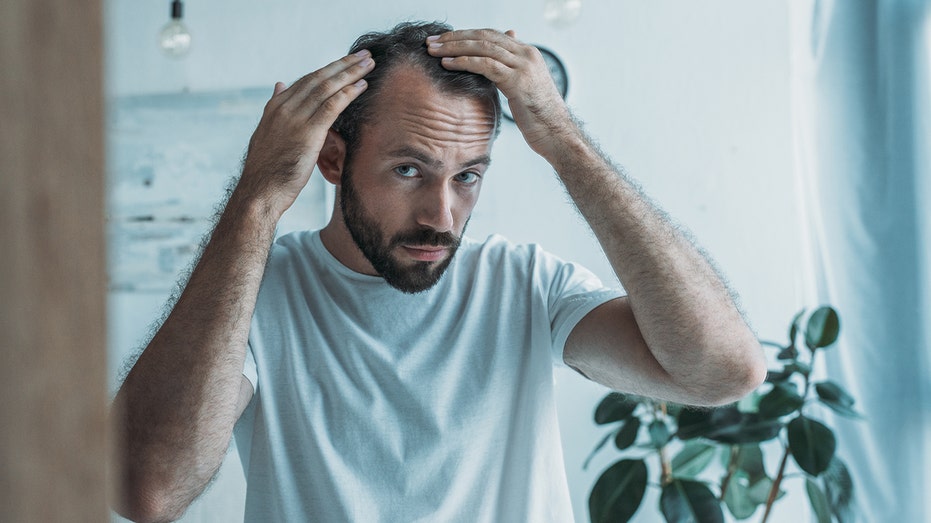Protein powers more than workouts, can also protect hair, according to experts
If your hair is shedding, thinning or breaking more easily lately, the problem could be hiding in your diet.Protein has gone mainstream, showing up in everything from popcorn to pancake mix to coffee creamer as people seek it to lose weight and build muscle. But it's also one of the most important nutrients for healthy locks, according to experts.Hair is primarily made of keratin, a protein built from amino acids, and without enough of it, strands can quickly lose strength and density.NEW 'CLEAR PROTEIN' HACK MUSCLES IN AS LATEST TREND IN THE BATTLE OF THE BULGE"As a hair surgeon, I see protein deficiency show up as diffuse shedding and weaker, more brittle strands," said Dr. Ross Kopelman, a hair transplant surgeon at Kopelman Hair Restoration, which has offices in New York, New Jersey and Florida."When the body isn't getting enough, it diverts amino acids to organs it views as essential for survival," Kopelman told Fox News Digital. "Hair production slows or shuts down, and patients often come to me describing that their hair just isn't as strong and is falling out more easily."The most common pattern, according to Kopelman, is thinning across the scalp, not patchy bald spots but it can be helped."When protein intake is corrected, shedding typically slows within a couple of months and density gradually improves as new hairs grow in over subsequent cycles," he said.SKIP THE MULTIVITAMIN: 5 NUTRIENT-RICH FOODS RECOMMENDED BY DOCTORS INSTEADResearch shows that protein deficiency is directly linked to brittle, sparse strands, slower regrowth and increased breakage, and a study in the Journal of Dermatology found that participants with lower protein intake experienced more diffuse thinning across the scalp.The current Recommended Dietary Allowance (RDA) is 46 grams per day for women and 56 grams for men, but Kopelman suggested more."I recommend most adults aim for about 1 to 1.2 grams per kilogram of body weight per day," he said. "For someone under stress, dieting or recovering from surgery, I might go up to 1.6 grams."EATING ONE TYPE OF NUT DAILY COULD LOWER 'BAD' CHOLESTEROL, IMPROVE HEART HEALTH, STUDY FINDSHe said he doesn't believe more than that will accelerate hair growth."What matters is consistently hitting that range, not pushing far above it," he said.Two amino acids packed in protein, lysine and cysteine are especially important for keratin production, according to research in the Journal of Nutrition. They're abundant in protein-rich foods like eggs, fish, poultry, legumes and seeds."Lysine helps with hair shaft formation and iron absorption, while cysteine contributes sulfur bonds that give the hair its strength," Kopelman said. "Patients often notice a difference when they shift toward more complete, amino acidrich sources of protein in their diet."CLICK HERE TO SIGN UP FOR OUR LIFESTYLE NEWSLETTERPlant-based diets can also support healthy hair when thoughtfully planned, he added. Pairing legumes and grains helps ensure complete proteins, while iron, B12, zinc and vitamin D should be closely monitored to avoid deficiencies that can independently trigger shedding.Dr. Shani Francis, chief wellness director of California-based Ashira Dermatology, recently told Everyday Health that, although protein deficiencies are rare in the U.S., even for vegans, they can contribute to hair loss, but factors like vitamin A excess, iron deficiency, thyroid disease, infection, stress or eating disorders may also be to blame.Hair is often the first thing to go when nutrition is lacking, she said."The body is using everything it can to keep what's most important [going]," she said.MORE FROM FOX NEWS LIFESTYLEFrancis also said that shedding 50 to 100 hairs per day is normal and not cause for concern.Protein supplements can be useful for people who struggle to meet daily targets such as those recovering from illness or weight loss but they're not a miracle cure."Extra scoops of powder won't override genetics, hormones or other limiting factors," Kopelman said. "Powders should fill gaps, not replace a balanced diet."He also cautions against poor-quality products, which may lack third-party testing or upset digestion. Whole foods provide additional nutrients like iron and zinc that powders can't match.While more research is needed on whether eating protein far beyond your needs can boost hair growth in otherwise healthy people, experts agree that hair follicles require a steady supply of amino acids from protein."For now, my advice is simple," Kopelman said. "Meet your daily needs, spread protein evenly across meals and view it as one part of a bigger picture that also involves hormones, stress management, micronutrients and genetics."




